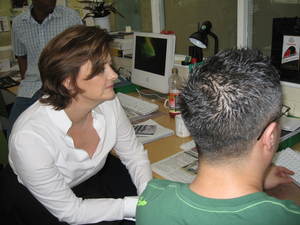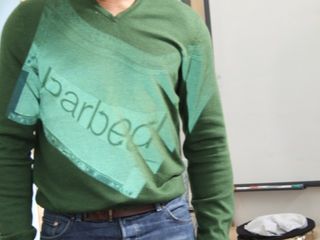Some time ago the Guardian agreed to take an article on an innovative prison work scheme which was sabotaged by the Prison Service. It was a follow-up to a series of articles I had done with a colleague on prison labour. The paper eventually decided not to run the piece and, as sometimes happens, I moved on to the next job and never developed it. Then an email from Solidarity Magazine reminded me. So below is the piece...
A report on an axed prison work scheme says it offers a valuable case study on how such projects might help rehabilitate offenders.
The Barbed project was set up at HMP Coldingley in 2005 by the Howard League for Penal Reform. The graphic design studio employed outside professionals to train and manage prisoners to carry out work for outside clients. Employees were paid a wage with tax and national insurance deducted.
It was praised by various people and organisations interested in prison reform and rehabilitation including Cherie Blair (pictured below visiting the project) and Iain Duncan Smith's Centre for Social Justice.
 In 2008 Barbed folded after the Howard League said that the constant movement of prisoners and the decision by Revenue and Customs that prisoners could not pay tax made it impossible to continue.
In 2008 Barbed folded after the Howard League said that the constant movement of prisoners and the decision by Revenue and Customs that prisoners could not pay tax made it impossible to continue.
Prof Penny Green, from Kings College London, was asked by the League to track what happened to the prisoners and trainers in the time since.
Her report found that of the 11 prisoners employed by the studio the League maintained contact with nine and seven gave evidence to the report. Two have been released and are now working as graphic designers. A third was deported to Albania and is apparently hoping to continue his design career in that country. Of those who remain inside, four have been transferred to other prisons and have used their skills to develop projects there. The rest have been unable to carry on with design work.
One employee was Stewie (not his real name), 36, from London, who joined Barbed in October 2005 until he was transferred to an open prison in November 2006. He is now employed as a graphic designer by the Howard League.
For him the one thing that stood out was a very personal memory.
“When I talked to my son and he’d ask me what I’d been doing usually I’d make up some bullshit because I’d mopped the landing or something,” he said. “Instead I could explain what I had learnt at work that day and talk to him about that.”
 The report by Prof Green (pictured left) says that alongside practical skills such as using design software and managing budgets and projects Barbed gave prisoners a sense of achievement, self-belief, patience and tolerance.
The report by Prof Green (pictured left) says that alongside practical skills such as using design software and managing budgets and projects Barbed gave prisoners a sense of achievement, self-belief, patience and tolerance.
Another prisoner, Terry, who was still inside when the report was written, said: “Barbed gave me a way to provide for my family and contribute in their lives positively. I was able to help pay bills, provide in new ways and support myself. I felt I was less of a burden to my family financially and this has had a great impact on all our relationships.”
Dominic, who has gone on to higher education, said: “It’s not a single skill but the whole experience that I had I take with me.”
Barbed employees, recruited after passing two interviews, would turn up for work between 8am and 8.30am. The day would start with a team meeting and then it was down to business.
Visitors to the light and vibrant room would immediately notice the difference from the dour sign-making shop next door.
Stewie said: “It was a bit like a zoo. If there were any important people visiting then the governor would bring them down and they would stare at us through the door windows.
“We put things up on the wall so that it was like any other workplace. The prison staff thought of it as that funny project going on in the corner.”
 Nicci Shepherd, one of the trainers, called the Barbed studio “a little bubble of creativity” at Coldingley.
Nicci Shepherd, one of the trainers, called the Barbed studio “a little bubble of creativity” at Coldingley.
“These were the most committed people I ever worked with,” she said. “They gave 100%. In the end we became quite a close knit team.”
Like other trainers Shepherd said she was very much affected by her experience.
Much as Barbed attempted to run as a normal business the report says the prison regime made that difficult.
There were mandatory two-hour lunch breaks and the prison week ended on Friday lunchtime. Barbed employees talk about the frustration at being locked away until Monday morning. More problematic were the sudden lock downs, transfers or prisoners called for drug tests which.
Coldingley’s Independent Monitoring Board said that Barbed needn’t be a single experiment. It’s a view Prof Green’s report supports.
“It really is the way forward if you are serious about reducing re-offending,” she said. “Engagement in meaningful work is good for prisoners, good for prisoners and good for society. It is a no-brainer.”